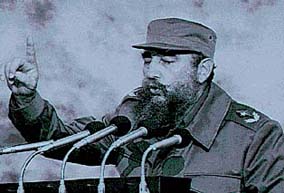 |
 |
Fidel Castro
Cuban Leader
Fidel Castro Ruz was born on August 13, 1926, on his family's sugar plantation near Biran, Oriente province, Cuba. His father, originally an immigrant laborer from Galicia, Spain, became owner of a 23,000-acre plantation.
As a boy, Castro worked in the family's sugar cane fields and, at 6 years old, convinced his parents to send him to school. He attended two Jesuit institutions, the Colegio Lasalle and the Colegio Dolores, both in Santiago. In 1942 he entered the Colegio Belen, a Jesuit preparatory school in Havana. He was voted the school's best athlete in 1944.
In 1945 Castro attended the University of Havana's Faculty of Law,and having earned a law degree, went into practice in 1950 in Havana with two partners. As a lawyer he devoted himself to helping the poor.
Castro intended to campaign for a parliamentary seat in the election of 1952 but General Fulgencio Batista overthrew the government of President Carlos Prio Socarras in a coup d'etat and canceled the election. Castro went to court and charged the dictator with violating the constitution. The court rejected Castro's petition. With no legal recourse left, Castro organized an armed attack by 165 men on the Moncada Barracks in Oriente province on July 26, 1953. That attack and the one on Bayamo garrison failed completely. Half the attackers were killed; Castro and his brother Raul were taken prisoner. They were released in a general amnesty on May 15, 1955.
Castro tried unsuccessfully to oppose the military dictatorship by peaceful
means. He then went to Mexico and organized Cuban exiles into another fighting
force called the 26th of July Revolutionary Movement. The group of 82 men
launched an attack on the north coast of Oriente province on December 2,
1956. Again, the attempt met defeat; only 12 of the original attackers
survived. Nevertheless, the 12 retreated to the Sierra Maestra mountains
and from their mountain
stronghold waged continuous guerrilla warfare against the Batista government.
His movement grew to 800 men, and scored victory after victory. A defeated
Batista fled the country on New Year's Day 1959, and Castro's force
made a victorious entry into Havana. The United States recognized the new
government on January 7, 1959. Castro assumed the position of premier in
February. Soon, however, friction occurred between Castro and the United
States when the new Cuban government began expropriating American owned
properties for inadequate compensation. In February 1960, Cuba became friendly
with the USSR, and made an agreement to buy Russian oil. After Cuba had
seized nearly all U.S.-owned properties in Cuba and made further agreements
with other communist governments, the United States broke diplomatic relations
with the Castro government.
Cuba and the United States were brought into confrontation on two occasions
soon after Castro had taken power. The United States made an unsuccessful
attempt to destabilize the Castro government. On April 17, 1961, a force
of 1,300 Cuban exiles, supported by the CIA, made an unsuccessful attempt
to invade Cuba at a southern coastal area called the Bay of Pigs. The assumption
was that the invasion would inspire the Cuban population to rise up and
overthrow Castro.
It was a U.S. miscalculation; the Cuban population supported him. In October, 1962 the so-called Cuban Missile Crisis occurred when the U.S. government discovered the Soviet Union was setting up long-range ballistic missiles in Cuba. These were perceived by the United States as a threat. President Kennedy instituted a naval blockade of Cuba that lasted until Khrushchev agreed to remove the missiles. Thereafter, U.S.-Cuban relations remained mutually hostile.
Castro became a committed Marxist-Leninist who nationalized industry, confiscated property owned by non-Cubans, collectivized agriculture, and enacted policies to benefit laborers and peasants. Many of the middle class fled the country, some establishing a large, active anti-Castro community in Miami, Florida. Castro has supported a number of other revolutionary movements in Latin America and Africa.
Cuba became increasingly dependent on the USSR, and the Soviet Union's
collapse in 1990 has brought economic hardship to Cuba. The problem of
Cuban refugees landing on U.S. shores has recently brought the Cuban
and U.S. governments together in negotiations. Conversely, tensions
were heightened when Cuban fighters shot down two unarmed, U.S.-registered
aircraft piloted by an anti-Castro relief organization engaged in
rescuing Cuban refugees
www.rjgeib.com/thoughts/fidel/fidel.html - castro/rebel/tyrant
acad.smumn.edu/fidel/index.html- castro homepage
cnn.com/resources/newsmakers/world/namerica/castro.html- castro and the world
www.weisbord.org/Castroism.htm-
castro's life